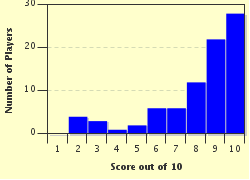Quiz Answer Key and Fun Facts
1. In the dramatic conclusion to season 4, President Bartlet invoked the 25th Amendment to the US Constitution. What subject is the 25th Amendment concerned with?
2. An episode in the second season highlights which parliamentary debate tactic, employed by Senator Stackhouse to draw attention to the needs of children with autism?
3. Josh spends a lot of time talking with and about the Minority Leader. Who or what is the Minority Leader?
4. Unsurprisingly, it takes a lot of committees to keep the US government ticking along. The one mentioned most often on "The West Wing" is called Ways and Means. Broadly speaking, what is this committee responsible for?
5. In the episode "On the Day Before" we learn about the presidential veto, which President Bartlet uses on a bill to repeal the estate tax. Once a bill has been vetoed by the President, how can it become law?
6. President Bartlet hails from this north-eastern state, which has the honour of holding the first Presidential primary in each national election cycle.
7. Much of 6th season of "The West Wing" focuses on the presidential nomination process, including the peculiarities of campaigning in different states. What is portrayed as a headline issue in Iowa?
8. In the first season, Donna has to choose someone from the Presidential line of succession to sit out the State of the Union address. Obviously the Vice President comes after the President, but who is next?
9. In the episode "H-Con 172" President Bartlet receives a formal reprimand over his failure to disclose his medical history prior to election. What is the term for this process of registering the disapproval of Congress?
10. Over the course of the 7-year story arc of "The West Wing", President Bartlet appointed three justices to the Supreme Court. Other than the President, whose approval ("confirmation") is required for the nominee to take up their appointment?
Source: Author
lorance79
This quiz was reviewed by FunTrivia editor
ladymacb29 before going online.
Any errors found in FunTrivia content are routinely corrected through our feedback system.

